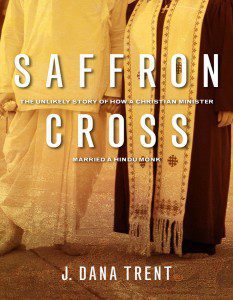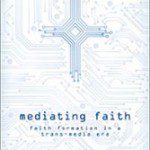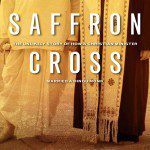 My endorsement of Rev. Dana Trent’s wonderful new book, Saffron Cross, appears on the book’s back cover, so I’m not going to praise the book or encourage you to read it other than to say this is a great book and you should read it. Nor am I going to critique the book, because there is nothing to critique: Dana is sharing her story, and not telling every Christian woman to marry a former Hindu monk. What I am going to do is comment on the larger phenomenon of interfaith marriage. I don’t believe in it.
My endorsement of Rev. Dana Trent’s wonderful new book, Saffron Cross, appears on the book’s back cover, so I’m not going to praise the book or encourage you to read it other than to say this is a great book and you should read it. Nor am I going to critique the book, because there is nothing to critique: Dana is sharing her story, and not telling every Christian woman to marry a former Hindu monk. What I am going to do is comment on the larger phenomenon of interfaith marriage. I don’t believe in it.
Over the past three decades of officiating at interfaith weddings my sense of the matter is that while the people I marry come from different religious backgrounds (or none), they share the same faith. To put it bluntly: an observant Hasidic Jew rarely if ever marries a secular Jew let alone an observant and devout Hindu.
The hundreds of people I know in so–called interfaith marriages are people who share the same basic beliefs about reality, morality, love, money, and childrearing, and while they may have differing ways of articulating these shared values—ways that reflect the religions from which they come—the values themselves are the same.
Case in point: My son identifies as a Jew, was raised as an observant, if creatively so, Jewish home, and teaches American Jewish literature and Jewish Civilization at the university level. Last June he married a first–generation Greek–American woman from a Greek Orthodox Christian background. Both of them are English professors.
Yes, they come from different religions, but they share a common faith: religions are narratives that have to be parsed rather than believed in. Abraham and Sarah, Moses and Miriam, Jesus and Mary, are characters in a narrative that, when interpreted, can yield meaning and wisdom. But the biblical narrative is no more sacred than the Bhagavad Gita or the The Brothers Karamazov. My son and daughter–in–law are open to wisdom from any text, and cannot accept the exclusivist claims of any religion. So are they an interfaith couple, or a couple devoted to wisdom wherever they find it?
When they have children they will pass their faith on to them: faith in the human capacity for meaning–making and wisdom–creating, and faith in the human ability to express meaning and wisdom in the many narrative forms we humans have invented: poetry, prose, music, movies, television, etc. There is nothing “inter” in this.
The Saffron Cross’s tag line, “The unlikely story of how a Christian minister married a Hindu monk” is good marketing, but the real story Dana Trent tells is about love. Love may not sell as many books, but it is the better story. You really should read it.
To read an excerpt from Saffron Cross, visit the Patheos Book Club here.
 Rabbi Rami Shapiro writes the JudaismNext blog on Patheos.com and is the author of Perennial Wisdom for the Spiritually Independent (Skylight Paths).
Rabbi Rami Shapiro writes the JudaismNext blog on Patheos.com and is the author of Perennial Wisdom for the Spiritually Independent (Skylight Paths).













